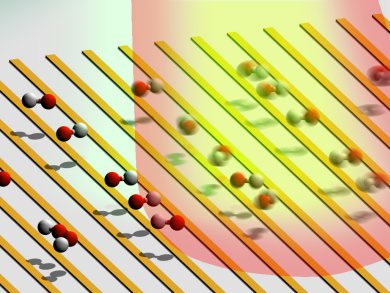Home > Press > Switching Qubits with a Terahertz Source?
 |
| Molecules on a Chip |
Abstract:
Scientists in Germany and the USA have been able to induce rotational transitions in molecules trapped at a close distance above a chip using a terahertz source. The new results, which are published in ChemPhysChem, could have interesting applications in quantum computing.
Switching Qubits with a Terahertz Source?
Berlin, Germany | Posted on March 2nd, 2011Polar molecules in selected quantum states can be guided, decelerated and trapped using electric fields created by microstructured electrodes on a chip. One of the possible applications of such molecules on a chip is their use in future quantum computers. However, to achieve this, researchers must be able to drive transitions from a certain quantum state to another one, that is, they should to be able "to switch a qubit (or quantum bit)". A transition between two rotational levels in a molecule is very well suited for this, and that is the reason why Gabriele Santambrogio and co-workers at the Fritz Haber Institute of the Max Planck Society in Berlin and Liam Duffy of the University of North Carolina at Greensboro decided to use a rather uncommon narrowband terahertz (THz) source to induce rotational transitions in laser-prepared metastable CO molecules. The researchers coupled the source to a chip setup that had been previously developed by them and studied the transitions between two quantum states in polar molecules trapped on the chip.
Unique Approach
According to co-author Gerard Meijer, both the experimental approach and the results of this work are unique. The combination of laser-prepared molecules in a single rotational level, tunable narrow-band mm-wave radiation that can transfer the population to another rotational level, and state-selective detection of the molecules at a known delay and position, offers many interesting possibilities. With this approach, the research team has not only been able to trap the polar molecules on a chip but has also played further games with them — like inducing the rotational transitions. Meijer believes that these results could find important applications in quantum computing: "In the future, it is conceivable that compact THz sources are integrated on a chip, and that one can use this to switch between qubits in a routine fashion", he says.
####
Copyright © Wiley-VCH Verlag GmbH & Co. KGaA
If you have a comment, please Contact us.Issuers of news releases, not 7th Wave, Inc. or Nanotechnology Now, are solely responsible for the accuracy of the content.
| Related Links |
![]() Driving Rotational Transitions in Molecules on a Chip
Driving Rotational Transitions in Molecules on a Chip
| Related News Press |
News and information
![]() Researchers develop molecular qubits that communicate at telecom frequencies October 3rd, 2025
Researchers develop molecular qubits that communicate at telecom frequencies October 3rd, 2025
![]() Next-generation quantum communication October 3rd, 2025
Next-generation quantum communication October 3rd, 2025
![]() "Nanoreactor" cage uses visible light for catalytic and ultra-selective cross-cycloadditions October 3rd, 2025
"Nanoreactor" cage uses visible light for catalytic and ultra-selective cross-cycloadditions October 3rd, 2025
Chip Technology
![]() Lab to industry: InSe wafer-scale breakthrough for future electronics August 8th, 2025
Lab to industry: InSe wafer-scale breakthrough for future electronics August 8th, 2025
![]() A 1960s idea inspires NBI researchers to study hitherto inaccessible quantum states June 6th, 2025
A 1960s idea inspires NBI researchers to study hitherto inaccessible quantum states June 6th, 2025
![]() Programmable electron-induced color router array May 14th, 2025
Programmable electron-induced color router array May 14th, 2025
Quantum Computing
![]() Researchers develop molecular qubits that communicate at telecom frequencies October 3rd, 2025
Researchers develop molecular qubits that communicate at telecom frequencies October 3rd, 2025
![]() Researchers tackle the memory bottleneck stalling quantum computing October 3rd, 2025
Researchers tackle the memory bottleneck stalling quantum computing October 3rd, 2025
![]() Japan launches fully domestically produced quantum computer: Expo visitors to experience quantum computing firsthand August 8th, 2025
Japan launches fully domestically produced quantum computer: Expo visitors to experience quantum computing firsthand August 8th, 2025
Announcements
![]() Rice membrane extracts lithium from brines with greater speed, less waste October 3rd, 2025
Rice membrane extracts lithium from brines with greater speed, less waste October 3rd, 2025
![]() Researchers develop molecular qubits that communicate at telecom frequencies October 3rd, 2025
Researchers develop molecular qubits that communicate at telecom frequencies October 3rd, 2025
![]() Next-generation quantum communication October 3rd, 2025
Next-generation quantum communication October 3rd, 2025
![]() "Nanoreactor" cage uses visible light for catalytic and ultra-selective cross-cycloadditions October 3rd, 2025
"Nanoreactor" cage uses visible light for catalytic and ultra-selective cross-cycloadditions October 3rd, 2025
Interviews/Book Reviews/Essays/Reports/Podcasts/Journals/White papers/Posters
![]() Spinel-type sulfide semiconductors to operate the next-generation LEDs and solar cells For solar-cell absorbers and green-LED source October 3rd, 2025
Spinel-type sulfide semiconductors to operate the next-generation LEDs and solar cells For solar-cell absorbers and green-LED source October 3rd, 2025
![]() Rice membrane extracts lithium from brines with greater speed, less waste October 3rd, 2025
Rice membrane extracts lithium from brines with greater speed, less waste October 3rd, 2025
|
|
||
|
|
||
| The latest news from around the world, FREE | ||
|
|
||
|
|
||
| Premium Products | ||
|
|
||
|
Only the news you want to read!
Learn More |
||
|
|
||
|
Full-service, expert consulting
Learn More |
||
|
|
||








